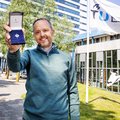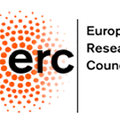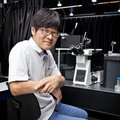Researchers of TU Delft contribute globally recognised research in fields as diverse as quantum nano, bio-nanotechnology, civil engineering, maritime technology, architecture, transport, water management, aerospace technology and robotics. Some of them have been awarded an honorary distinction or prize for their academic achievements, or received a substantial research grant. We are proud to present a selection of these prizes and the scientists that won them.
On this page, we have included both the excellence programs of the ERC and NWO, which are seen as important indicators for scientific excellence (see for example the national ‘Balans van de Wetenschap’ (Science balance sheet), as well as important accreditations that focus specifically on engineering sciences.
Fotocredits header: NWO, fotografie: Bram Saeys
Excellence programmes
The European Union grants, through the European Research Council (ERC) scholarships to scientists doing fundamental and ground-breaking research. The ERC awards five types of grants. There are personal grants for early-career scientists (Starting Grant), grants for more experienced scientists (Consolidator Grant) and grants for established researchers leading in their field (Advanced Grant).
The ERC Proof of Concept Grant helps ERC grant holders to bridge the gap between research and commercial or societal potential. In addition to the personal grants, ERC also awards a grant to ground-breaking, interdisciplinary partnerships: the Synergy Grant. For an overview of the ERC Grants granted to TU Delft scientists please check the ERC website below.
The Netherlands Organization for Scientific Research (NWO) provides individual grants for research through their Talent Programme. The Talent Programme provides financing for research to do creative and free research in several career stages. The “Veni” for starting researchers, the “Vidi” for more experience researchers setting up their research group and the “Vici” for senior researchers who have already established a research line.
Apart from general prizes and grants, there are specific distinctions within the beta and engineering sciences that can be regarded as a proxy for excellence. Important recognitions include the Prins Friso Engeneering prize, which is awarded annually to the Dutch engineer of the year: an engineer who distinguishes his or herself in expertise, innovative capacity, social impact and entrepreneurship. Once every five years, the Christiaan Huygens science prize is dedicated to physics and likewise once every five year the prize is dedicated to information and communication technology.
2020
In 2020, various award ceremonies were cancelled or postponed unfortunately. Nonetheless, several specific distinctions within the beta and engineering sciences were awarded to TU Delft scientists. For example, the Dutch Prize for ICT Research was awarded to a TU Delft scientist for the second time in a row: this year, the honour went to prof.dr. Pablo Cesar. He is given the award for his research on modelling and controlling complex collections of media objects. Dr. Emiel Lorist received the KWG Price for his doctoral research. Dr.ir. Ad van Well and colleagues (3mE) received the Vanadium award, for the best scientific article concerning research into vanadium. Additionally, dr. Arthur Gorter de Vries (Biotechnology) received the Westerdijk Award for the best dissertation of the year in the category Environmental & Applied Microbiology, and Jasmijn Hassing received the KNVM/MVMM Kiem Award for young microbiology researchers. The H.I. Waterman Sustainability Award was awarded to dr.ir. Marie-Eve Aubin-Tam. This award is presented biannually to a researcher working at Applied Sciences of TU Delft who contributes to developments that simultaneously strengthen our economy and improve the environment.
2019
In 2019, several of these specific distinctions within the beta and engineering sciences were awarded to TU Delft scientists. For example, The Dutch Royal Insititute of Engineers (KIVI) awarded the KIVI Academic Society Award 2019 to Prof.dr.ir. Andy van den Dobbelsteen, professor of Climate Design & Sustainability and Prof.dr. Kobus Kuipers received, as one of the founders of “nanophotonics”, the Physica Prize 2019, a prize awarded annually to an eminent physicist working in the Netherlands. Additionally, Prof.dr. Elmar Eisemann received the Dutch Prize for ICT Research 2019, Dr. Dion Gijswijt was awarded the N.G. De Bruijn Prize by the Royal Dutch Mathematical Society for his influential paper on combinatorial optimisation, Dr. Menno Veldhorst has been awarded the Nicholas Kurti Science Prize 2019 for his ground-breaking work on silicon- and germanium-based electron spin quantum bits, and Prof.dr. Dariu Gavrila has received the Outstanding Research Award 2019 from the IEEE Intelligent Transportation Systems (ITS) Society.
2018
In 2018, several of these specific distinctions within the beta and engineering sciences were awarded to TU Delft scientists. Dr. Nima Tolou, for example, was awarded the Prins Friso Engineering prize as Dutch Engineer of the Year, prof.dr. Mark van Loosdrecht received the prestigious Stockholm Water Prize, prof.ir.em. Hans de Jonge has been awarded the Hudig Medal – a medal only awarded once every five years - for his efforts in the fields of Housing and Urban Planning, prof.dr.ir. Sybrand van der Zwaag was the first Dutch scientist to receive the Grande Médaille of the French Society for Metallurgy and Materials SF2M (Société Française de Metallurgie et de Matériaux), prof.dr. Jack Pronk was honored with the International Metabolic Engineering Award for his contribution to metabolic engineering and prof.dr.ir. Jan Dirk Jansen received a Distinguished Membership and Distinguished Achievement Award from the Society of Petroleum Engineers.
Science, engineering and design: these are the cornerstones of research at TU Delft. Sometimes, researchers of TU Delft are awarded design prizes. A new grab design, developed by transport engineer dr.ir. Dingena Schot and her team in cooperation with the Dutch grab manufacturer Nemag, has won an international design prize in 2018, the Red Dot Award. Previously, the design received an Innovative Technology Award.
For more prizes and grants, see the overview with related news items on this page.




